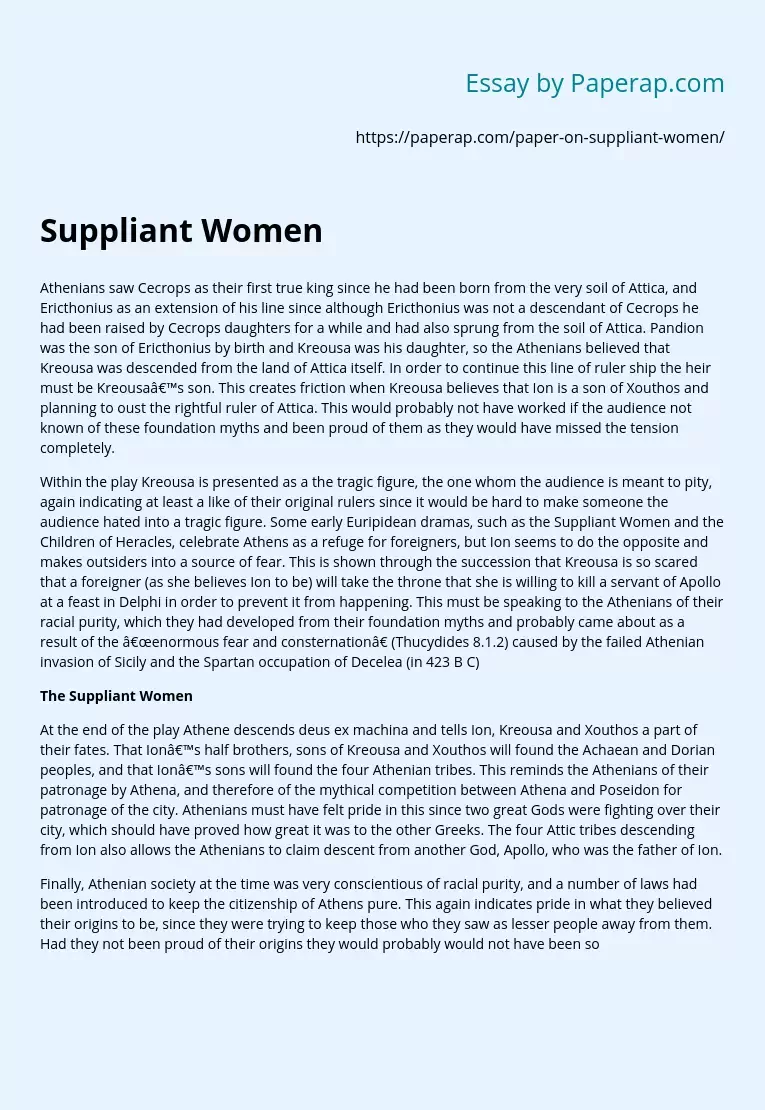The following example essay on “The Suppliant Women” is an analysis of the ancient Greek play by Aeschylus, in which the Danaids seek protection from King Pelasg. The work reveals the plot and images of the main characters of the literary work.
Athenians saw Cecrops as their first true king since he had been born from the very soil of Attica, and Ericthonius as an extension of his line since although Ericthonius was not a descendant of Cecrops he had been raised by Cecrops daughters for a while and had also sprung from the soil of Attica.
Pandion was the son of Ericthonius by birth and Kreousa was his daughter, so the Athenians believed that Kreousa was descended from the land of Attica itself. In order to continue this line of ruler ship the heir must be Kreousa’s son. This creates friction when Kreousa believes that Ion is a son of Xouthos and planning to oust the rightful ruler of Attica.
This would probably not have worked if the audience not known of these foundation myths and been proud of them as they would have missed the tension completely.
Within the play Kreousa is presented as a the tragic figure, the one whom the audience is meant to pity, again indicating at least a like of their original rulers since it would be hard to make someone the audience hated into a tragic figure. Some early Euripidean dramas, such as the Suppliant Women and the Children of Heracles, celebrate Athens as a refuge for foreigners, but Ion seems to do the opposite and makes outsiders into a source of fear.
This is shown through the succession that Kreousa is so scared that a foreigner (as she believes Ion to be) will take the throne that she is willing to kill a servant of Apollo at a feast in Delphi in order to prevent it from happening. This must be speaking to the Athenians of their racial purity, which they had developed from their foundation myths and probably came about as a result of the “enormous fear and consternation” (Thucydides 8.1.2) caused by the failed Athenian invasion of Sicily and the Spartan occupation of Decelea (in 423 B C)
At the end of the play Athene descends deus ex machina and tells Ion, Kreousa and Xouthos a part of their fates. That Ion’s half brothers, sons of Kreousa and Xouthos will found the Achaean and Dorian peoples, and that Ion’s sons will found the four Athenian tribes. This reminds the Athenians of their patronage by Athena, and therefore of the mythical competition between Athena and Poseidon for patronage of the city.
Athenians must have felt pride in this since two great Gods were fighting over their city, which should have proved how great it was to the other Greeks. The four Attic tribes descending from Ion also allows the Athenians to claim descent from another God, Apollo, who was the father of Ion.
Finally, Athenian society at the time was very conscientious of racial purity, and a number of laws had been introduced to keep the citizenship of Athens pure. This again indicates pride in what they believed their origins to be, since they were trying to keep those who they saw as lesser people away from them. Had they not been proud of their origins they would probably would not have been so keen to keep other people out of Athens, since they could claim some kinship with those they let in and share in their origins.
Also, many of their more famous foundation myths were painted on vases, erected as statues or decorations on temples, and generally readily visible to anyone who was looking. A country with no pride in its origins would not make those origins so easy for its citizens or its visitors to see.
"The Suppliant Women". (2019, Dec 05). Retrieved from https://paperap.com/paper-on-suppliant-women/

